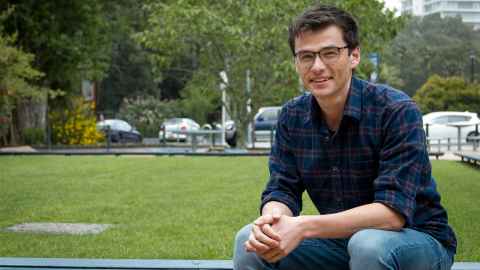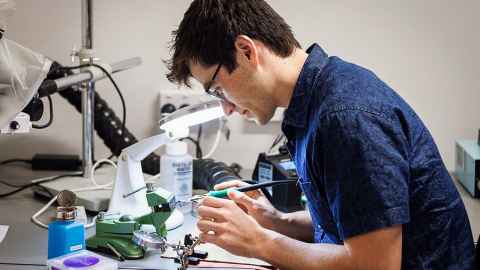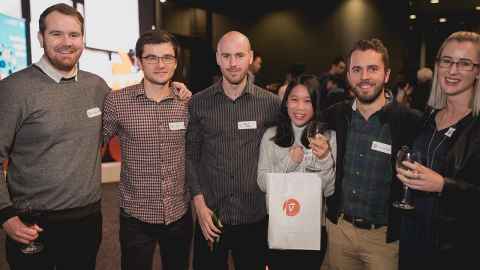Kieran Brennan
Kieran discusses his PhD research into needle-free injection, his experience at MIT and his entrepreneurial co-venture.

Journey to doctoral studies
"I’ve been interested in the application of science and technology to improve human experience since high school. An undergraduate degree in Engineering Science amplified my interest in physics and applied maths, and, through my current PhD research in medical device development, I’ve been able to employ these skills in the biological domain. For me, the human-outcome element is as attractive as the technical complexity of biomedical engineering, and for this reason I’ve also been drawn towards some entrepreneurial side projects with the aim of making a positive impact."
The PhD programme has provided me with multiple opportunities for development beyond purely research pursuits.
Passion for research
"My research project is in the area of jet injection, an alternative approach to the traditional needle-and-syringe method of delivering drugs that removes the need for a needle.
"The device we are developing delivers drugs such as vaccines and insulin by creating a narrow, high-speed jet that penetrates the top layers of skin and into the underlying tissue. A small electric motor pushes the liquid drug out through a very narrow opening and helps it generate enough speed to burrow a tiny hole through the skin, where it then begins to disperse. Due to variations in the thickness and toughness of people’s skin, one difficulty with this technique is controlling the depth of drug delivery. I’m solving this problem using a laser imaging system to track the depth of the jet as it is injected. This will then allow us to monitor and control the progression of the injection as it descends into the tissue."

Opportunities during the PhD
"The PhD programme has provided me with multiple opportunities for development beyond purely research pursuits. In my second year, I visited Massachusetts Institute of Technology for a three-month exchange to one of their labs – a collaborator on our injector technology. The students’ level of responsibility and ambition was very motivating, and the experience made me grateful for my own community back home at the ABI.
"Back on home ground, I’ve been involved in the PhD Research Innovation and Commercialisation course and the PhD Leadership Development Programme. These programmes appealed to me because of the collaborative nature of their problem-solving challenges, something that can be hard to come by during individual PhD research. Both courses helped me reframe how I view academic research in a broader context, and extended the circle of friends I can rely on for an honest and informed perspective on complex topics."
"Attending international conferences has been a highlight of my PhD. Discussions with Silicon Valley entrepreneurs about human-computer interaction and breakfast with the president of SPIE, a large international optics society, are among my most memorable moments."

Entrepreneurial activities
"One of the most exciting things emerging in the university is the entrepreneurial culture. The ABI in particular has generated a number of companies that began as research projects. I was fortunate enough to remain involved with the company Soul Machines as it spawned out of Mark Sagar’s research lab, which I had been a part of during my Honours-year research. Seeing its transition from research group to rapidly-growing organisation gave me incredible insight into the impact that research can have on technological outcomes at a societal level.
"My own entrepreneurial lean has recently led me to co-found a venture called The REST Project. We’re bringing psychological fitness into the mainstream using courses based around the practise of sensory deprivation. It involves floating in a pool of salt water void of any sensory stimulus such as light, sound or air movements - also commonly referred to as flotation therapy. The activity is an intensely mindful experience without the discipline needed for regular meditation, and we’re creating behaviour training programmes based around repeated practise. Through the Velocity competitions and discussions with the university’s Return on Science committee, we’ve received invaluable feedback and are set to launch the second version of our course to centres around the country in the coming month."
Find out more: Soul Machines.
Key facts
Programme: PhD in Bioengineering
Research topic: Real-time depth monitoring of needle-free jet injection
Supervisors: Associate Professor Andrew Taberner, Professor Poul Nielsen, Dr Bryan Ruddy
Academic unit: Auckland Bioengineering Institute (ABI)
Funding: University of Auckland Doctoral Scholarship